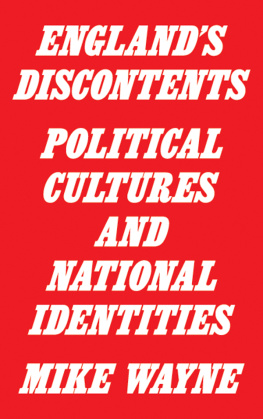Wayne - Englands discontents: political cultures and national identities
Here you can read online Wayne - Englands discontents: political cultures and national identities full text of the book (entire story) in english for free. Download pdf and epub, get meaning, cover and reviews about this ebook. City: Great Britain, year: 2018, publisher: Book Network Intl Limited trading as NBN International (NBNi);Pluto Press, genre: Politics. Description of the work, (preface) as well as reviews are available. Best literature library LitArk.com created for fans of good reading and offers a wide selection of genres:
Romance novel
Science fiction
Adventure
Detective
Science
History
Home and family
Prose
Art
Politics
Computer
Non-fiction
Religion
Business
Children
Humor
Choose a favorite category and find really read worthwhile books. Enjoy immersion in the world of imagination, feel the emotions of the characters or learn something new for yourself, make an fascinating discovery.
Englands discontents: political cultures and national identities: summary, description and annotation
We offer to read an annotation, description, summary or preface (depends on what the author of the book "Englands discontents: political cultures and national identities" wrote himself). If you haven't found the necessary information about the book — write in the comments, we will try to find it.
Wayne: author's other books
Who wrote Englands discontents: political cultures and national identities? Find out the surname, the name of the author of the book and a list of all author's works by series.
Englands discontents: political cultures and national identities — read online for free the complete book (whole text) full work
Below is the text of the book, divided by pages. System saving the place of the last page read, allows you to conveniently read the book "Englands discontents: political cultures and national identities" online for free, without having to search again every time where you left off. Put a bookmark, and you can go to the page where you finished reading at any time.
Font size:
Interval:
Bookmark:

Englands Discontents
Discontents
Political Cultures and
National Identities
Mike Wayne

First published 2018 by Pluto Press
345 Archway Road, London N6 5AA
www.plutobooks.com
Copyright Mike Wayne 2018
The right of Mike Wayne to be identified as the author of this work has been asserted by him in accordance with the Copyright, Designs and Patents Act 1988.
British Library Cataloguing in Publication Data
A catalogue record for this book is available from the British Library
ISBN 978 0 7453 9932 4 Hardback
ISBN 978 0 7453 9933 1 Paperback
ISBN 978 1 7868 0321 4 PDF eBook
ISBN 978 1 7868 0323 8 Kindle eBook
ISBN 978 1 7868 0322 1 EPUB eBook
This book is printed on paper suitable for recycling and made from fully managed and sustained forest sources. Logging, pulping and manufacturing processes are expected to conform to the environmental standards of the country of origin.
Typeset by Swales & Willis
Simultaneously printed in the United Kingdom and United States of America
The national question is today returning to the political agenda in a rebalancing of priorities after a period in which radical politics was largely defined by a transnational, anti-globalisation focus. With the collapse in the 1990s of nation-state regimes claiming to be communist, and with capitalism operating on an increasingly transnational basis, transnational political movements targeting multinational institutions, such as at the summit meetings of the big powers or transnational corporations, indicated a shift in political energies consonant with the moment. Yet the Arab Spring and the Egyptian Revolution of 2011 in particular, returned us joltingly to the question of political power at the national level. Here all the classic tropes of the revolutionary situation returned a popular revolt against a hated government embodied in a particular figure (Mubarak), a violent oppressive state meeting popular resistance that then fractures the army, the role of external nation-states allied with the oppressive state and its national oligarchy, an alliance of popular forces overcoming to some extent prior divisions and, perhaps most pressingly and what was least satisfactorily resolved in the Egyptian case: what would the political organisational forms and objectives be that could displace the status quo? In short, power and the legitimacy of power and counter-power on the terrain of the nation-state were starkly posed.
The Egyptian Revolution, whose symbolic centre had been the occupation of Tahrir square in Cairo, in turn spawned the Occupy movement in Spain, North America, Britain and elsewhere. Although this was a synchronous international movement, this was also the beginning of each movement turning towards its own national context and state to demand change. Thus we saw the rising popularity of once-marginal parties such as Syriza in Greece, the formation of new political parties such as Podemos in Spain or newly vibrant forces emerge on the Left within the old established parties, such as Bernie Sanderss 2016 run at the Democratic Presidential candidate in the US or the bolt-from-the-blue success of Jeremy Corbyn in becoming leader of the Labour Party in 2015. This return to the national stage for political contestation is a tacit recognition that governmental power gives access to at least some branches of state power and state power remains a significant prize in the struggle for a better world. This is not to say that the transnational arena in which nation-states are situated is not criss-crossed by very powerful economic and institutional forces that are operating above the nation-state. Yet these forces and organisations struggle to achieve anywhere near as much legitimacy and democratic credibility as the nation-state has accumulated, despite continuing deficiencies, over several hundred years.
Despite the international context of nation-state development and therefore the commonalities which similar social and economic structures produce, the national question is a question of the specificity of national development in each case. In the British context there has been an extensive debate about the historical formation of Britishness and how that determines our present condition. In this debate, what has loomed large has been the early development of agrarian capitalism in England especially and how that may have cemented the economic, political and symbolic power of an agrarian elite that in turn gave an inflection and centrality to ruralism, undemocratic state institutions and an antidemocratic, anti-meritocratic ideology in the British imaginary. The historical development of the Industrial Revolution, another world first, then adds a new set of social and cultural forces to the mix, themselves split between those attached to industrial capital and those that made up the industrial workforce. The complex relationships between these new social agents and practices and the older ones associated with agrarian capitalism produce in turn a wide range of interpretations and debates concerning these relations and their actual and desired relative weight and importance in the formation of Britishness as a composite outcome of all these relationships. This reflexive commentary on historical developments becomes in turn a part of the historical process. And this is all overlaid again by the development of the empire whose legacy and long-term effects, economic, political and cultural, are still active and contested in our contemporary scene. All this before we even consider how this complex of forces, including the rise of the middle class, entered into and were transformed again by the twentieth century.
So a return to the national question in a British context, means a return to debates about the specific history of national identities that form the composite notion of Britishness. Identities in part because in the British case, this is a supranational unit made up of both regional and national identities (England, Wales and Scotland, but also Northern Ireland and before 1922 the entirety of Ireland). Identities because (as the case of Ireland already alerts us to) imperial power projection meant that Britishness was entangled globally with territories around the world and then subsequently inward migration brought significant numbers of people from the former colonies into Britain, especially after the Second World War. Identities also because different classes and alliances between classes have struggled to shape Britishness in their own collective image. And identities because contesting political cultures have developed as the key organisational forces that have brought together regions, nations, ethnicities and classes and given them particular accents, narratives and political and cultural representation. The term political cultures refers to recognisable value systems that seek representation at the level of the state but which have their roots in a capillary-like network of social, economic and cultural relationships far broader than formal institutions of political power (i.e. parliament and parties).
Everything above already indicates that I do not approach national identities in the classic manner of the British or English authors who enumerate an arbitrary list of discrete characteristics (e.g. modest and self-effacing, emotionally reticent, individualistic, polite, practical, etc., etc.). Such approaches to the question of identity lack both a sense of historical change and formation (they become unchanging essences) and a sense of structure or the structuring forces that gives rise to the empirical characteristics. They also often conceal how a particular (upper class) identity has come to stand in for the national. In this empirical approach we move from a rather haphazard and apparently subjective list of traits to a universal:
Font size:
Interval:
Bookmark:
Similar books «Englands discontents: political cultures and national identities»
Look at similar books to Englands discontents: political cultures and national identities. We have selected literature similar in name and meaning in the hope of providing readers with more options to find new, interesting, not yet read works.
Discussion, reviews of the book Englands discontents: political cultures and national identities and just readers' own opinions. Leave your comments, write what you think about the work, its meaning or the main characters. Specify what exactly you liked and what you didn't like, and why you think so.








